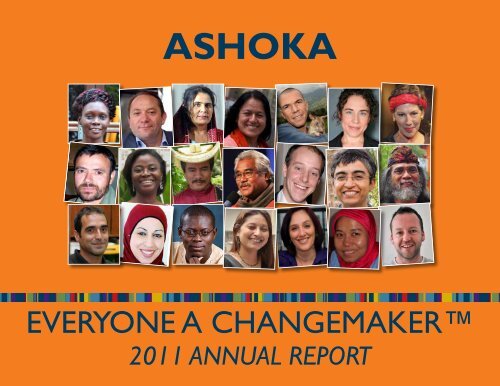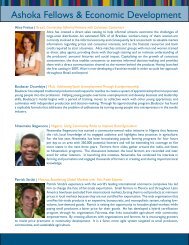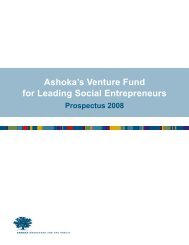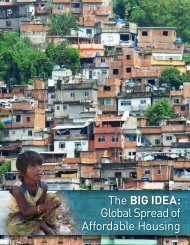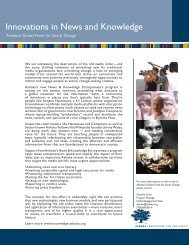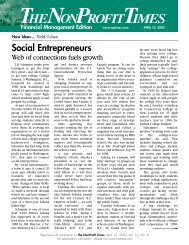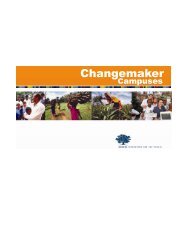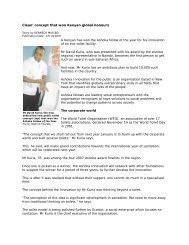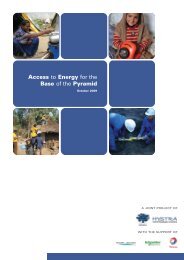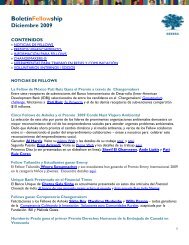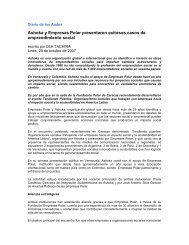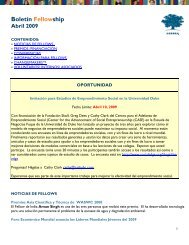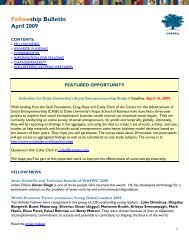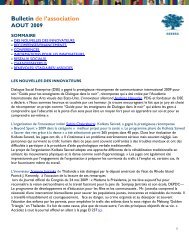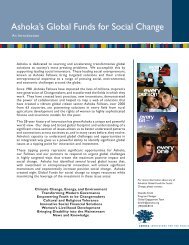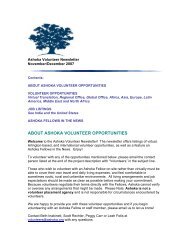cont. - Ashoka
cont. - Ashoka
cont. - Ashoka
You also want an ePaper? Increase the reach of your titles
YUMPU automatically turns print PDFs into web optimized ePapers that Google loves.
ASHOKA<br />
EvEryonE a ChangEmakEr<br />
2011 AnnuAl REPORT
Rodrigo Baggio,<br />
elected to the <strong>Ashoka</strong><br />
Fellowship in 1996,<br />
empowers the poor<br />
to use information<br />
and communication<br />
technology. Since<br />
he was elected, his<br />
organization, the Center<br />
for Digital Inclusion, has<br />
trained 1.25 million<br />
people in 803 selfmanaged<br />
and selfsustaining<br />
community<br />
centers in 13 countries.<br />
Rodrigo was selected to<br />
participate in <strong>Ashoka</strong>’s<br />
first Globalizer in 2010.<br />
He is pictured here in<br />
the Cantagalo favella in<br />
Rio de Janeiro.<br />
Photo: John maier, Jr./<br />
The Image Works<br />
Cover Image<br />
ashoka Fellows<br />
from around the<br />
world—individuals<br />
with systemchanging<br />
solutions<br />
to the world’s most<br />
challenging social<br />
problems.
message from our President<br />
ashoka is proud to be celebrating its 30th anniversary this year - three decades of building the citizen sector in over 70<br />
countries. We began by pioneering the concept of social entrepreneurship introduced by ashoka’s founder and CEo Bill<br />
Drayton. ashoka has since identified nearly 3,000 social entrepreneurs who are leading the charge, whose new solutions<br />
are challenging conventional ideas and changing the world for the better. The professionalization of the field represents<br />
an historical shift in how societies perceive the agency of individuals to drive social change. as we look to the future we<br />
understand that the only way to address the growing number of problems is to ensure that there are more problem solvers<br />
in society. This explosion of empowerment and activity will require fundamental shifts in parenting and education, as well as<br />
changes in how businesses and governments engage in the world. ashoka seeks to serve this historical moment for greatest<br />
social impact.<br />
Thanks to our global network and partners, ashoka has uncovered various insights about social change and impact. We<br />
initially saw that the most profound change occurs when an entrepreneur pursues a system-changing idea—more than half<br />
of ashoka Fellows have changed national policy after five years. We’ve also learned that the scaling and replication of these<br />
models requires a particular enabling environment, which can be cultivated. ashoka calls this enabling environment an<br />
Everyone a Changemaker world, a world that responds quickly and effectively to social challenges and where every individual<br />
is equally empowered to effect social change. In 2011, an unprecedented number of social entrepreneurs gathered in<br />
Paris to define and develop the necessary ecosystem for accelerating social change. It was characterized by two ideas:<br />
collaborative action and concentration of changemakers.<br />
as you are reading the following pages, we would ask you to look for opportunities for action in your own sphere of<br />
influence. you are very much part of the movement which thousands of ashoka Fellows and supporters are building across<br />
the world. The world ashoka ultimately strives to create is about everybody effecting change, and we welcome you as a<br />
co-creator.<br />
Sincerely yours,<br />
EvEryonE a ChangEmakEr (2011 annUaL rEPorT) 3
our vision and mission<br />
Mission<br />
ashoka endeavors to create an Everyone a Changemaker world—one where each person is equipped with the skills, drive, and resources to push<br />
forward solutions to pressing social and environmental problems, and each organization is designed to maximize the changemaking potential of its<br />
members.<br />
History<br />
ashoka was founded as an answer to a question: given the immensity of the problems facing this planet, how can we ever hope to solve them?<br />
our hypothesis: the institutions traditionally expected to solve such problems cannot experiment and fail quickly enough to respond to the everchanging<br />
environment. The solution is to support and invest in social entrepreneurs, the people so driven to change an entrenched global problem<br />
that they will stop at nothing, and so creative that they see beyond the existing barriers to change and invent entirely new solutions. The ideas,<br />
models and movements created by these social entrepreneurs will then ripple throughout society.<br />
Bill first tested his theory in 1978, when he traveled to India, Indonesia, and venezuela to find and interview people with game-changing approaches<br />
to solve problems in their regions, people whom he later gave the name “social entrepreneur.” Blown away by the power and impact of their work,<br />
as well as their fast growing numbers, Bill founded ashoka in 1980. While the initial goal of the organization was to encourage and assist social<br />
entrepreneurs as they worked to make the world better, ashoka realized soon enough that a truly changed world will require everyone—from<br />
school child to prime minister—to value and drive social innovation. out of this insight was born our Everyone a Changemaker mission.<br />
Approach<br />
rather than focus solely on individual social entrepreneurs as engines of innovation,<br />
ashoka recognizes that successful and lasting social change is a collaborative endeavor.<br />
ashoka works in areas ranging from empathy education to agricultural innovation,<br />
but in each of these areas, we bring together teams of people with common goals<br />
Group<br />
Social<br />
Everyone a Changemaker<br />
Entrepreneurand<br />
equip them with the entrepreneurial tools and resources they need to tackle Entrepreneurs<br />
ship<br />
some of the world’s most challenging social problems. In so doing, we not only give<br />
rise to innovative new solutions, but we also create microcosms of changemaking<br />
that demonstrate the power and potential of an Everyone a Changemaker world.<br />
EvEryonE a ChangEmakEr (2011 annUaL rEPorT) 4
<strong>Ashoka</strong> Fellow lily<br />
Thapa from nepal<br />
is reversing age old<br />
taboos and practices<br />
against widows in<br />
Nepal, breaking down<br />
the barriers that<br />
prevent them from<br />
being active members<br />
of civil society. lily will<br />
be featured in the first<br />
book written about<br />
<strong>Ashoka</strong>’s approach to<br />
system change, Rippling,<br />
available April 2012<br />
from Wiley/Jossey-Bass.
What We Do<br />
Identify, Help Launch, and Support Social<br />
Entrepreneurs<br />
<strong>Ashoka</strong> invests in people. We search the world for the<br />
leading social entrepreneurs. at launch stage, we provide<br />
these Fellows with a living stipend for an average of three<br />
years which allows them to focus full-time on building their<br />
institutions and spreading their ideas.<br />
Foster Collaborative Entrepreneurship<br />
ashoka accelerates social impact by engaging communities<br />
of entrepreneurs in ripening fields to think and create<br />
together to tip the world.<br />
Build an Everyone a Changemaker World<br />
a truly changed and sustainable world will require everyone<br />
to have the essential skills of changemaking: empathy,<br />
teamwork and leadership for change. More problem<br />
solvers and barriers torn down between sectors will result<br />
in safer, happier, more equal and more successful societies.<br />
<strong>Ashoka</strong> Fellow Ishita Chaudhry launched Youth Parliament in India, the country’s<br />
largest direct advocacy organization for young people. She has built a national<br />
network of young leaders who organize themselves and educate government<br />
officials on the views and opinions of India’s 300 million young people.<br />
Photo: Kyle Taylor<br />
EvEryonE a ChangEmakEr (2011 annUaL rEPorT) 6
our global reach<br />
ashoka is the global association of the world’s leading social entrepreneurs—men and women with system changing solutions for the world’s<br />
most urgent social problems. Since 1981, we have elected nearly 3,000 leading social entrepreneurs as ashoka Fellows, providing them<br />
with living stipends, professional support, and access to a global network of peers in over 70 countries.<br />
The americas<br />
asia<br />
argentina<br />
Bolivia<br />
Europe<br />
austria<br />
Belgium<br />
Czech republic<br />
afghanistan<br />
Bangladesh<br />
Sub-Saharan africa<br />
Botswana<br />
Burkina Faso<br />
Cameroon<br />
Brazil<br />
Canada<br />
Denmark<br />
France<br />
germany<br />
East Timor<br />
hong kong<br />
gambia<br />
ghana<br />
guinea-Bissau<br />
Chile<br />
Colombia<br />
hungary<br />
Iceland<br />
Ireland<br />
India<br />
Indonesia<br />
Ivory Coast<br />
kenya<br />
mali<br />
Costa rica<br />
Ecuador<br />
Italy<br />
Latvia<br />
Lithuania<br />
Japan<br />
nepal<br />
mozambique<br />
niger<br />
nigeria<br />
guatemala<br />
mexico<br />
netherlands<br />
norway<br />
Poland<br />
Pakistan<br />
Singapore<br />
Senegal<br />
South africa<br />
Swaziland<br />
nicaragua<br />
Paraguay<br />
Slovakia<br />
Spain<br />
Sweden<br />
Sri Lanka<br />
Thailand<br />
Tanzania<br />
Togo<br />
Uganda<br />
Peru<br />
United States<br />
Switzerland<br />
Turkey<br />
United kingdom<br />
Zambia<br />
Zimbabwe<br />
Uruguay<br />
venezuela<br />
middle East/north africa<br />
Egypt Israel Jordan kuwait Lebanon morocco Palistinian Saudi arabia<br />
Territory<br />
EvEryonE a ChangEmakEr (2011 annUaL rEPorT) 7
2011 at a glance<br />
<strong>Ashoka</strong> Launches Empathy<br />
In may 2011, ashoka launched an<br />
initiative aimed at changing the way<br />
our education system works, so<br />
that empathy becomes as much of<br />
a priority as math or language arts.<br />
Building on proven practices and<br />
strategies established by hundreds<br />
of Fellows working with children, we<br />
aim to equip principals, teachers, and<br />
parents with the tools they need to<br />
effectively grow and nurture empathy<br />
in today’s youth. Learn more at:<br />
startempathy.org<br />
Bill Drayton and <strong>Ashoka</strong> Win<br />
Top U.S. Philanthropic/Citizen<br />
Sector Recognition, the John W.<br />
Gardner Leadership Award<br />
Bill Drayton, founder and CEo of<br />
ashoka: Innovators for the Public,<br />
received the prestigious John W.<br />
gardner Leadership award. The<br />
award was established in 1985 to<br />
honor outstanding americans who<br />
exemplify the leadership and the<br />
ideals of John W. gardner (1912-<br />
2002), american statesman and<br />
founding chair of Independent Sector.<br />
Independent Sector presents the<br />
award each year to an individual whose<br />
leadership in or with the nonprofit<br />
community has been transformative<br />
and who has mobilized and unified<br />
people, institutions, or causes that<br />
improve people’s lives.<br />
Bill Drayton and <strong>Ashoka</strong> Win<br />
Prince of Asturias Award (“The<br />
Spanish Nobel”)<br />
Bill Drayton, founder and CEo of<br />
ashoka: Innovators for the Public,<br />
took home a tremendous honor in<br />
2011. Drayton was awarded the Prince<br />
of asturias Prize for International<br />
Cooperation, Spain’s highest honor<br />
and nobel Prize equivalent. The<br />
Prince of asturias award aims to<br />
“reward the scientific, technical,<br />
cultural, social, and humanistic work<br />
performed at an international level<br />
whose work has <strong>cont</strong>ributed in both<br />
an exemplary and relevant way to the<br />
mutual understanding, progress or<br />
fellowship among peoples.”<br />
<strong>Ashoka</strong> Launches<br />
the 20/20 Campaign<br />
In october 2011, ashoka launched<br />
the 20/20 Campaign—an initiative to<br />
source 20 entrepreneurs (business<br />
or social) to engineer big systems<br />
changes on key issue areas that<br />
ashoka has identified as being ripe for<br />
bold entrepreneurial leadership such<br />
as youth, empathy, health, housing,<br />
Japan, and africa among others. Learn<br />
more at 2020.ashoka.org.<br />
EvEryonE a ChangEmakEr (2011 annUaL rEPorT) 8
2011 at a glance, <strong>cont</strong>.<br />
Changemakers Week in Paris<br />
In June 2011, ashoka hosted the<br />
Changemakers Week in Paris which<br />
included workshops, debates, and<br />
brainstorming sessions designed for<br />
participants to learn more about<br />
groundbreaking business and social<br />
change models and the power of<br />
social innovation. Presenters shared<br />
cutting-edge strategies currently<br />
making a difference in a dozen<br />
fields including energy, sustainable<br />
agriculture, education, and affordable<br />
housing.<br />
<strong>Ashoka</strong> Turns 30<br />
In 2011, ashoka celebrated its<br />
30th anniversary—thirty years of<br />
pioneering vision and action. Starting<br />
with the first ashoka Fellow elected<br />
in India in 1981 to the hundreds of<br />
social entrepreneurs who joined<br />
our network this year, the combined<br />
social impact of the ashoka has<br />
grown extensively. our Fellows<br />
alone directly reach more than 300<br />
million citizens across the globe.<br />
Their influence as pattern changers is<br />
reshaping the entire fields of health,<br />
economic development, education<br />
and the environment.<br />
For ashoka’s birthday, we asked our<br />
community around the world to<br />
share their ashoka stories. Share in<br />
the celebration at www.ashoka.org/<br />
ashoka-birthday-blogs.<br />
A Wonderful Birthday Gift, A Changemaker’s Story<br />
Lani Frazier, Founder of Synergies in Sync.<br />
“as a bone-tumor survivor at the age of five and<br />
first-generation Filipino-american who emigrated<br />
from Tondo manila to the US at the age of nine, the<br />
acculturation and personal transformation experience<br />
was not easy. an entire village of family and friends,<br />
mentors, role models, advisors, and teachers have<br />
helped guide me to where I am today; but the journey<br />
of finding my life’s meaning did not have clarity until I was a doctoral student<br />
at Pepperdine University years ago and discovered ashoka.<br />
This discovery was a clear, defining, moment and I’m happy to say that<br />
my entire world has been pleasantly re-arranged ever since! Windows of<br />
possibilities opened; I felt feverish to help bring this life-changing experience<br />
and newfound confidence to others. at the time I discovered ashoka, I was<br />
pursuing my doctoral research work on women entrepreneurs and computer<br />
gaming. But, I knew that if I truly wanted to investigate the issue of hoW to<br />
increase awareness for a life of changemaking in all people, I had to explore<br />
and learn from the experts. I re-directed the entire focus of my research<br />
towards studying ashoka Fellows in the education and workforce sector. I<br />
was interested in exploring how we can truly help prepare all people for<br />
the life of a changemaker. and I mean all people, not just practitioners or<br />
academics interested in social entrepreneurship.<br />
Today, I’m a full-time changemaker (young late bloomer) and social<br />
entrepreneur-in-the-works through my work at my consulting company,<br />
Synergies in Sync. I am also a part-time adjunct professor and get to mentor<br />
young changemakers every day, which I love so much. I’m a multi-disciplinarysocio-techie<br />
inspired-educator by trade, and a business entrepreneur of an<br />
on-demand education and marketing consulting and talent services boutique<br />
firm that’s dedicated to fostering the Everyone a Changemaker movement. our<br />
company slogan is “helping changemakers champion the world”!<br />
ashoka has highly influenced the outcome of my career...and for that I thank<br />
you and am forever grateful.<br />
EvEryonE a ChangEmakEr (2011 annUaL rEPorT) 9
Impacting Society Through System Changes<br />
“Social entrepreneurs are not <strong>cont</strong>ent just to give or teach how to fish.<br />
They will not rest until they have revolutionized the fishing industry.”<br />
Bill Drayton, Chairman & CEo<br />
If our goal is to revolutionize the fishing industry (or any other industry), how will we know we have succeeded?<br />
Success will be a fundamental shift in the system that surrounds a given problem in society. Donella meadows, the author of Thinking in Systems, defines<br />
a system as “an interconnected set of elements that is coherently organized in a way that achieves something.” In summary, a system <strong>cont</strong>ains elements,<br />
interconnections, and a purpose. Consider a football team as a system. The elements are the players, coach, field, and ball. The interconnections are the<br />
rules of the game and the purpose is to win games. Changing elements of a system has the least effect on the system. a football team remains a team<br />
even if every player, coach, and field are changed though it may play better or worse. however, changing the interconnections of a system has profound<br />
effects; for example, changing the rules of football can lead to the game of basketball. a change in purpose of the system also has profound effects on the<br />
system—for example making the purpose of the game to allow every player a chance to play.<br />
We have learned ashoka Fellows change systems primarily through the power of their ideas. most build organizations as vehicles to advance their<br />
ideas. They also significantly <strong>cont</strong>ribute to strengthening the entire citizen sector as ashoka Fellows recognize that achieving large-scale change requires<br />
spreading and advancing their ideas through complex and diverse networks.<br />
Suraiya haque developed a self-sustaining model for child care services in Bangladeshi factories. The factories pay for child care<br />
themselves because they see the economic benefits. haque has institutionalized the practice of installing worker-friendly child care<br />
centers in the factories enabling leading multinational corporations to be in compliance with standards of operation in Bangladesh.<br />
how do we fairly measure the impact of her work? Do we count the numbers of children currently being served by her organization?<br />
What about the children who will benefit five years from now? What about the women who are able to earn better incomes? and<br />
what about all the households and children served by the people who copied Suraiya haque’s model? Those numbers do not begin<br />
to tell the story of the impact of her work. her impact is that she engineered a completely new norm in the industry resulting in<br />
social benefits on many levels.<br />
EvEryonE a ChangEmakEr (2011 annUaL rEPorT) 10
Fellow Criteria and Selection Process<br />
A New Idea (the knock-out test)<br />
ashoka cannot elect someone to the Fellowship unless he or she is possessed by a new<br />
idea—a new solution or approach to a social problem—that will change the pattern in a field,<br />
be it human rights, the environment, or any other. We evaluate the idea historically and against<br />
its <strong>cont</strong>emporaries in the field, looking for innovation and the potential for lasting change.<br />
Social Impact<br />
This criterion focuses on the candidate’s idea rather than the candidate. ashoka is only<br />
interested in ideas that it believes will change the field significantly and that will trigger<br />
nationwide impact or, for smaller countries, broader regional change. For example, ashoka<br />
will not support the launch of a new school or clinic unless it is part of a broader strategy to<br />
reform the education or health system at the national level or beyond.<br />
Creativity<br />
Successful social entrepreneurs must be creative both as goal-setting visionaries and as<br />
problem solvers capable of engineering their visions into reality. Creativity is not a quality that<br />
suddenly appears—it is almost always apparent from youth onward. among the questions we<br />
might ask: Does this individual have a vision of how he or she can meet some human need<br />
better than it has been addressed before? Does the candidate have a history of creating other<br />
new visions?<br />
Entrepreneurial Quality<br />
Perhaps our most important criterion, entrepreneurial quality is the defining characteristic of<br />
first class entrepreneurs. It defines leaders who see opportunities for change and innovation<br />
and devote themselves entirely and forever how long it takes to make their historical vision<br />
the new pattern. Because they cannot be satisfied in life until this happens, they are wide-open<br />
listeners focused on the how-to questions, who constantly adapt their work as they learn and<br />
conditions change.<br />
Ethical Fiber<br />
Social entrepreneurs introducing major structural changes to society have to ask a lot of<br />
people to change how they do things. If the entrepreneur is not trusted, the likelihood of<br />
success is significantly reduced. ashoka asks every participant in the selection process to<br />
evaluate candidates for their ethical fiber rigorously. To do so often requires one to resort to<br />
instinct and gut feelings, not just rational analysis. The essential question is: “Do you trust this<br />
person absolutely?” If there is any doubt, a candidate will not pass.<br />
What makes <strong>Ashoka</strong> Fellows unique?<br />
ashoka Fellows are visionaries who develop innovative solutions that<br />
fundamentally change how society operates. They find what is not working<br />
and address the problem by changing the system, spreading the solution, and<br />
persuading entire societies to take new leaps. much like the rare, top business<br />
entrepreneurs who redefine industries, social entrepreneurs persist however<br />
long the transformation takes. They are creative yet pragmatic, constantly<br />
adjusting and changing, with a committed vision that endures until they have<br />
succeeded. The following are five examples of leading social entrepreneurs in<br />
whom ashoka has invested.<br />
Examples of <strong>Ashoka</strong> Fellows Elected in 2011<br />
Ishita Chaudhry, India; The youth Parliament Foundation<br />
Ishita is ridding Indian society of the deeply held premise that<br />
youth should have little or no say in matters of public policy that<br />
directly impact their lives. her organization, the youth Parliament<br />
Foundation (TyPF) strengthens youth-led movements in India by<br />
creating opportunities for youth to engage with social change<br />
and transform an adult-dominated system to one where young people have the<br />
ability to exercise their rights.<br />
Josh nesbit, USa, global; medic mobile<br />
Josh is creating connected and coordinated rural health care<br />
systems, transforming the efficacy of decentralized rural public<br />
health by reinventing the role of the locally-based community<br />
health worker thanks to smart and simple mobile-phone based<br />
solutions. Instantaneous communication among community<br />
health workers and between community health workers and physicians and<br />
nurses at clinical hubs means that citizen health workers can provide care to<br />
their communities with much less dependence on a centralized medical facility.<br />
EvEryonE a ChangEmakEr (2011 annUaL rEPorT) 11
ashoka Fellows Worldwide *<br />
395<br />
654<br />
Sub-Saharan africa Europe South america<br />
asia north and Central america middle East/north africa<br />
*as of aug 2011<br />
EvEryonE a ChangEmakEr (2011 annUaL rEPorT) 12<br />
332<br />
353<br />
63<br />
832
our Impact<br />
Percent of Fellows Who have Changed a System at a national<br />
Level in at Least one Way Within 10 years of Election<br />
our Fellows change systems in five different ways:<br />
Redefining interconnections in market systems through increased access to goods and services, creation of new markets and providing ways for low-income people to<br />
generate income.<br />
market Dynamics and value Chains 48%<br />
Changing the rules that govern our societies through organized citizen action, changes to industry organizations and to national policies.<br />
Public Policy and Industry norms<br />
51%<br />
Transforming the meaning of private vs. citizen sector by earning revenue, having a business joint venture and having a common vision for social impact with the business sector.<br />
Business Social Congruence<br />
72%<br />
Fully integrating marginalized populations by connecting critical parts of society and increasing empathy toward marginalized groups.<br />
Full Citizenship and Empathic Ethics 53%<br />
Increasing the number of people who are social problem-solvers by partnering with institutions to create programs promoting social entrepreneurship and creating skill<br />
trainings to solve social problems.<br />
Culture of Changemaking<br />
and Social Entrepreneurship<br />
44%<br />
83%<br />
Source: 2010 Impact Study “ashoka Fellows Changing Systems”<br />
conducted by ashoka and the Corporate Executive Board<br />
EvEryonE a ChangEmakEr (2011 annUaL rEPorT) 13
Press Perspectives<br />
World Bank Institute<br />
“We live in a time where the numbers and complexity of problems seem to be outracing the numbers of solutions. ashoka works to increase<br />
the number of people creating solutions—solutions to all of society’s problems. ashoka’s vision is a world where everyone is a changemaker.<br />
ashoka Fellows have dramatic (often national and global scale) impact in their specific fields. and yet the biggest impact social entrepreneurs can<br />
have is not necessarily their solutions to problems; it is their recruiting thousands of local changemakers to give their ideas wings in community<br />
after community.”<br />
Diana Aviv, President and CEO, Independent Sector<br />
“Before ashoka, who had ever heard of social entrepreneurship? ashoka has defined and been central to building the field both through the<br />
supporting framework of ideas and institutions it keeps creating and the benchmark excellence of its 3,000 truly leading social entrepreneur<br />
Fellows.”<br />
David Gergen, Director of Harvard Center on Public Leadership and Editor-at-Large for U.S. News and World Report<br />
“ashoka Fellows have built a long and storied history as pioneering change agents--men and women who are transforming their communities,<br />
their regions, and one day the world. They will always deserve our gratitude.”<br />
Stanford Business School’s Professor Laura Arrillaga-Andreessen in her new book<br />
“ashoka identifies and invests in social entrepreneurs around the world...who have come up with innovative and practical ideas for solving big<br />
global problems. Bill Drayton calls the individuals behind these ideas ‘changemakers.’ Changemakers work to create game-changing solutions that<br />
reinvent methods of delivering essential service and can be replicated, improving millions of lives. ‘our job is not to give people fish,’ he often<br />
tells people. ‘It’s not to teach them how to fish—it’s to build new and better fishing industries.’”<br />
Muhammad Yunus, Founder of the Grameen Bank, 2006 Nobel Peace Prize Winner<br />
“ashoka is a great global organization, built on a brilliant idea. It picks up social innovators when they themselves don’t know what great changes<br />
they can bring. That’s the stage when budding innovators need the support most. ashoka helps pool local innovations into global solutions.”<br />
EvEryonE a ChangEmakEr (2011 annUaL rEPorT) 14
ashoka Initiatives<br />
Venture & Fellowship<br />
venture & Fellowship are the mechanisms through which ashoka finds and supports the world’s leading social entrepreneurs. ashoka was founded on the venture model 30<br />
years ago and it remains the heart of ashoka—the work upon which all of our efforts depend. once elected, global Fellowship helps ashoka Fellows to do more together than<br />
they could do individually—providing a global perspective for local innovation. In 2011, ashoka welcomed over 125 new ashoka Fellows in 39 different countries.<br />
Changemakers<br />
Changemakers applies an open source principle of social problem-solving to anyone who chooses to participate through a series of online collaborative competitions in a<br />
community that treasures quality of idea, collegiality and innovation. In 2011, Changemakers sourced social innovations across a range of topics including improved nutrition,<br />
preventing violence against women, improving maternal health, improving mental health, community building in the northeast US, and financing for small-medium enterprises.<br />
Full Economic Citizenship<br />
Full Economic Citizenship (FEC) strives to enable an environment where every citizen has the opportunity and capacity to play a role in local and global economies, as<br />
consumers, producers and creators of wealth. at a minimum this means that each citizen must have access to the essential products and services—food, water, housing, energy,<br />
health, education, financial.<br />
a landmark article, “a new alliance for global Change” by FEC chief entrepreneur, valeria Budinich, and ashoka CEo and Founder, Bill Drayton, was published in the harvard<br />
Business review in 2010. This publication showcased the hybrid value chain framework that ashoka has identified, developed and facilitated for business and social actors to<br />
transform markets to serve the lowest-income populations in the world.<br />
Youth Venture<br />
youth venture inspires and invests in youth to create social ventures, providing a transformative experience of leading positive change. ashoka has engaged over 75,000 youth<br />
globally involved in over 4,000 youth-led teams.<br />
as of 2011, ashoka has helped launch 5,000 youth ventures in 19 countries. Staples and ashoka’s<br />
youth venture launched the fifth annual youth Social Entrepreneurship Competition to celebrate<br />
young changemakers who are creating impact through their youth-led social change ventures. The<br />
5th Staples youth Social entrepreneur competition had 300 entries for 50 countries.<br />
<strong>Ashoka</strong> Fellow Mary Gordon’s program, Roots of Empathy, works to reduce childhood<br />
aggression by teaching students emotional literacy and fostering the development of empathy.<br />
Her program, which consists of schools hosting parents and infants in a classroom setting, has<br />
been successfully launched in 133 Canadian schools, directly affecting some 4,450 children.<br />
EvEryonE a ChangEmakEr (2011 annUaL rEPorT) 15
ashoka Initiatives, <strong>cont</strong>.<br />
<strong>Ashoka</strong> U<br />
ashoka U works to strengthen social entrepreneurship in higher education by disseminating key knowledge and resources, recognizing innovation, and facilitating collaboration<br />
between institutions of higher education, and with social entrepreneur practitioners.<br />
In 2011, ashoka U increased the geographic diversity of its Changemaker Campus Consortium, including middlebury, Tecnológico Instituto de monterrey, and the University of<br />
San Diego. In addition, ashoka U inaugurated the ashoka U Exchange, bringing together a vetted group of 250 leaders in social entrepreneurship education and showcasing the<br />
best innovations in campus-wide change efforts.<br />
Globalizer<br />
In 2011, ashoka held two globalizers to identify the most effective international social entrepreneurs within our network of Fellows and help them expand their impact to<br />
become truly global in scale. ashoka leverages its global reach and network of social and business entrepreneurs to link initiatives ready for global scale to the financial, strategic<br />
and intellectual support they require. a select group of leading entrepreneurs from the private and social sectors support each participating Fellow in accelerator Panels—<br />
sharing their insights into proven strategies for rapid global growth, and crystallizing the key needs and challenges associated with each Fellow’s plan.<br />
Executive in Residence<br />
ashoka’s Executive in residence Social Entrepreneurship Program connects executives to inspiring on-site volunteer opportunities with ashoka Fellows around the world.<br />
Executives committed to social change will spend time with an ashoka Fellow’s organization, working on a project critical to the success of the organization’s mission. In return,<br />
executives will experience social entrepreneurship in action. Each placement is designed jointly by ashoka, our corporate partners, and ashoka Fellows for a variety of meaningful<br />
opportunities. Placements are managed by experienced and informed ashoka staff on the global and local levels. In 2011, ashoka chose four volunteers and matched them with<br />
ashoka Fellows around the world that required their specific expertise. In 2012, we plan to grow the initiative and match between five to ten executives with ashoka Fellows.<br />
Social Investment Entrepreneurs<br />
The Social Investment Entrepreneurs (SIE) program identifies and supports leading social<br />
entrepreneurs striving to allocate capital for social impact. The SIE program elects and supports<br />
ashoka SIE Fellows, expands knowledge about cutting-edge social investment models, engages<br />
major financial institutions to bring about large-scale social change, and works with other ashoka<br />
programs to catalyze global change. In 2011, the SIE program worked with the g20 SmE Finance<br />
Challenge to open-source the best models world-wide for public-private partnerships to finance<br />
small and medium enterprises.<br />
<strong>Ashoka</strong> Fellow Gilda Henríquez Darlas of Guatemala has developed a universal primary-school<br />
education program to equip children with the tools to become self-aware moral actors. Gilda is<br />
convinced that all people have the potential to develop empathy, compassion and wisdom if only<br />
given the opportunity to do so, which is the most fundamental purpose of her universal Education<br />
EvEryonE a ChangEmakEr (2011 annUaL rEPorT) 16
our Partners<br />
ashoka is a community of mission-aligned individuals, organizations and corporations driving catalytic social impact. If you share our vision and<br />
would like to talk about becoming a partner, we welcome your inquiry to invest@ashoka.org.<br />
Selected ashoka Investors and Business Entrepreneurs<br />
Jeffrey Skoll<br />
The Jensen Family<br />
Selected global Corporate Partners<br />
amgen<br />
Barclays Bank<br />
Boehringer Ingelheim<br />
Citigroup<br />
Selected University Partners<br />
arizona State University<br />
Babson College<br />
College of the atlantic<br />
Selected Foundations<br />
avIna<br />
Bill & melinda gates Foundation<br />
Carnegie Corporation of new york<br />
David & Lucile Packard Foundation<br />
Ford Foundation<br />
michael hilti<br />
Pierre and Pam omidyar<br />
The Corporate Executive Board<br />
google<br />
group Danone<br />
hilti Corporation<br />
Cornell University<br />
Duke University<br />
george mason University<br />
gE Foundation<br />
goldman Sachs Foundation<br />
John S. and James L. knight Foundation<br />
JP morgan Chase Foundation<br />
Lemelson Foundation<br />
Stephan Schmidheiny<br />
Sergey Brin and anne Wojcicki<br />
Latham & Watkins LLP<br />
mckinsey & Company<br />
nike, Inc.<br />
natura<br />
Johns hopkins University<br />
marquette University<br />
The new School<br />
one Foundation<br />
omidyar network<br />
robert Wood Johnson Foundation<br />
rockefeller Foundation<br />
Silicon valley Community Foundation<br />
Siemens<br />
Staples<br />
Western Union<br />
Tulane University<br />
University of maryland<br />
University of Colorado at Boulder<br />
Skoll Foundation<br />
W.k. kellogg Foundation<br />
EvEryonE a ChangEmakEr (2011 annUaL rEPorT) 17
2011 Partner highlights<br />
Making More Health—A Global Partnership with Boehringer Ingelheim<br />
making more health is a global, multi-year, multi-million initiative with Boehringer Ingelheim (BI) to promote healthy individuals, families<br />
and communities by identifying and supporting the most promising solutions to challenging health problems. This partnership will<br />
initiate the election of 50 new Fellows working on health issues, host two ashoka Changemaker competitions, and promote 300<br />
youth entrepreneurs to tackle health problems through ashoka’s youth venture program. It engages BI employees by inviting them to ashoka’s online network,<br />
empowering them to launch their own initiatives, allowing them to mentor youth venturers, and utilize ashoka’s Executive-In-residence program. Furthermore,<br />
ashoka is working with BI’s Strategy and Emerging markets teams to identify trends, patterns and opportunities in the health field that could have long-term<br />
impact on BI’s core business.<br />
“making more health brings together two organizations committed to finding innovative people and ideas to help shape the future of the health sector.<br />
Through this partnership we will bring forth meaningful and sustainable solutions that can achieve individual and family well-being in communities around<br />
the globe.”<br />
Professor Dr. andreas Barner, Chairman of the Board of managing Directors of Boehringer Ingelheim<br />
Citizen Media—Sourcing Global Innovation in Partnership with Google<br />
ashoka has collaborated with one of the most innovative corporations of our time, google, to build a movement around the idea of<br />
information for all. This collaboration initiated an ashoka’s Changemakers global competition to source innovations that develop media<br />
channels. With google’s support, ashoka selects four new ashoka Fellows who have surfaced through the Changemakers competition<br />
engine. While the ashoka Fellow selection is not limited to Changemakers entrants, google uses the competition as a way to strengthen ashoka’s Fellow<br />
selection process overall. This partnership overall accelerates how technology supports social entrepreneurship across the globe.<br />
The Brin Wojcicki Foundation Pledges $2 Million Honoring <strong>Ashoka</strong>’s 30th Anniversary<br />
The Brin Wojcicki Foundation – established by two of the world’s leading entrepreneurs, google co-founder Sergey Brin and anne Wojcicki, co-founder of<br />
23andme – pledged a $2 million grant to ashoka in 2011. The grant matched dollar-for-dollar a fundraising campaign honoring ashoka in its 30th anniversary this<br />
year.<br />
“The world needs more social and business innovators. That is why more people should get involved with ashoka. It inspires them to make a difference in<br />
their own lives, and enables them to take their great ideas to become system-changing, even global, in scope.”<br />
anne Wojcicki, Co-Founder 23andme Inc.<br />
EvEryonE a ChangEmakEr (2011 annUaL rEPorT) 18
The Financials *<br />
Statement of Activities<br />
2010 Total 2011 Total<br />
Public Support, Revenue & Gains<br />
Public Support 29,071,813 53,660,968<br />
revenue & gains (Losses) (308,148) 2,199,309<br />
Total Support & revenue › $28,763,665 $55,860,277<br />
Expenses<br />
Program Services<br />
Leading Social Entrepreneurs 10,806,571 13,631,698<br />
Idea Spread and Education 815,836 776,923<br />
new architecture 9,592,858 10,845,790<br />
group Entrepreneurship 7,843,654 8,612,159<br />
Total Program Services 29,058,919 33,866,570<br />
Supporting Services<br />
management & general 2,794,035 2,463,759<br />
Fundraising 2,673,067 1,799,755<br />
Total Supporting Services 5,467,102 4,263,514<br />
Total Expenses › $34,526,021 $38,809,519<br />
Increase (Decrease) in new assets from operations (5,762,356) 17,730,193<br />
Foreign Exchange (gains) Losses (617,069) 679,435<br />
Increase (Decrease) in net assets (6,379,425) 18,409,628<br />
net assets, Beginning of year 60,321,936 53,942,511<br />
net assets, End of year › $53,942,511 $72,352,139<br />
Statement of Financial Position<br />
2010 Total 2011 Total<br />
Assets<br />
Cash 8,163,860 13,881,753<br />
Pledges receivable 30,980,971 42,990,749<br />
Investments 28,737,725 28,146,491<br />
other assets 830,411 508,919<br />
Total assets › $68,712,967 $85,527,912<br />
Liabilities<br />
accounts Payable & accrued Expenses 667,513 806,872<br />
Fellowship obligations 14,102,943 12,368,901<br />
Total Liabilities › $14,770,456 $13,175,773<br />
Net Assets<br />
Unrestricted 132,657 183,516<br />
Temporarily restricted 34,732,217 51,786,705<br />
Permanently restricted 19,077,637 20,381,918<br />
Total net assests 53,942,511 72,352,139<br />
Total net assets & Liabilities › $68,712,967 $85,527,912<br />
annual global operating Expenses<br />
as the citizen sector has grown in scale and scope, so has ashoka. our goal is to have 80 percent of the<br />
world’s leading social entrepreneurs in the community and to have generated the richest mutual support<br />
and collaboration “network effect.” our operating budget has increased dramatically over the organization’s<br />
history and reflects ashoka’s expansion beyond our core venture program.<br />
($ thousands)<br />
50<br />
1980 1985 1990 1995 2000 2005 2006 2007 2008 2009 2010 2011<br />
ashoka’s work is funded by entrepreneurs, foundations, corporations, and individuals from around the world.<br />
ashoka does not accept funding from any government entities. Individual and institutional endowment funds<br />
provide for ashoka's long-term stability.<br />
Funding Since Inception<br />
Foundations<br />
220<br />
Corporation<br />
* Based on Cleveland & gotliffe<br />
independent auditor’s report<br />
Fiscal year 2011.<br />
ashoka is a not-for-profit<br />
organization with no religious<br />
or political affiliations. In<br />
the United States, ashoka<br />
is registered as a 501(c)(3)<br />
tax exempt organization.<br />
We also have tax deductible<br />
status under local law in many<br />
countries where we work.<br />
EvEryonE a ChangEmakEr (2011 annUaL rEPorT) 19<br />
20%<br />
4,249<br />
15%<br />
8,753<br />
65%<br />
17,469<br />
25,999<br />
31,181<br />
Individuals, Business<br />
Entrepreneurs and<br />
Their organizations<br />
40,783<br />
41,040<br />
34,526<br />
38,810
International Board of Directors<br />
William Drayton › Chairman & CEO<br />
Before founding ashoka, Bill Drayton was the assistant administrator<br />
of the US Environmental Protection agency from 1977 to 1981. Elected<br />
a macarthur Fellow in 1984, he also founded get america Working!,<br />
Environmental Safety, Community greens and youth venture. mr.<br />
Drayton previously worked with mckinsey & Co. and taught at<br />
Stanford Law School and the kennedy School of government.<br />
Mary Gordon › <strong>Ashoka</strong> Fellow<br />
mary gordon, member of the order of Canada, author, and ashoka<br />
Fellow, has created award-winning programs that have been informed<br />
by the power of the loving relationships of families. In 1996, ms.<br />
gordon founded roots of Empathy, a not-for-profit, evidence-based<br />
classroom program that has shown dramatic effect in reducing levels<br />
of aggression and violence among schoolchildren while raising social<br />
and emotional competence and increasing empathy.<br />
William C. Kelly › President, Stewards of Affordable<br />
Housing for the Future<br />
Bill kelly served as a Senior Partner at the Washington,<br />
D.C. based law firm of Latham & Watkins and now heads<br />
Stewards of affordable housing for the Future. he is also a Director<br />
of the Washington Legal Clinic for the homeless and the governance<br />
Institute. he chairs the Washington, D.C. Bar’s Community Economic<br />
Development Pro Bono Project and the Elderly housing Coalition.<br />
mr. kelly was a law clerk for Supreme Court Justice Lewis F. Powell, Jr.<br />
Kyle Zimmer › Founder, First Book<br />
kyle Zimmer co-founded First Book, a US based organization that<br />
supplies millions of poor children across the US with their first<br />
books. Prior to founding First Book, ms. Zimmer was an attorney,<br />
championed auto safety in thirty states, led a congressional office staff<br />
and served ohio governor richard Celeste.<br />
Gloria de Souza › First <strong>Ashoka</strong> Fellow<br />
Elected in 1982 as the first ashoka Fellow, gloria de Souza is the<br />
founder and Director of Parisar ashe, an environmental education<br />
center in mumbai, India. ms. de Souza has made experiential, problemsolving<br />
education attractive to teachers, principals and parents across<br />
India. Today, more than ten million children are learning with her<br />
approach, and the Indian government has adopted it for use in the<br />
schools it administers.<br />
Fred Hehuwat › Founder, The Green Indonesia<br />
Foundation<br />
While a student at Bandung Institute of Technology in Indonesia, Fred<br />
hehuwat co-founded the non-party student movement that played<br />
a critical role in ending the Sukarno era. mr. hehuwat has served<br />
as Director of the national academy of geology and mining, and<br />
he created Indonesia’s first citizen environmental organization, the<br />
green Indonesia Foundation.<br />
Roger Harrison › Newspaper Executive and Journalist<br />
Born in Ireland, roger has had an extensive career as the Chairman<br />
or non-Executive Director of public and private companies in the Uk<br />
and U.S. In 1967 he joined The observer, where he held the positions<br />
of Director and Joint managing Director. he was Chief Executive<br />
from 1984-1987. roger also served as Director at London Weekend<br />
Television, and as the Deputy Chairman of Capital radio.<br />
EvEryonE a ChangEmakEr (2011 annUaL rEPorT) 20
Ways to Engage<br />
ashoka strives to fulfill our vision of Everyone a Changemaker by encouraging people from all over the world to be involved in<br />
furthering our work.<br />
Invest in <strong>Ashoka</strong> › ashoka provides a variety of ways you can <strong>cont</strong>ribute financially to support our work.<br />
www.ashoka.org/donate<br />
Join Our Team › Learn about career, internship, and volunteer opportunities. go directly to our online application<br />
(for internships and jobs). www.ashoka.org/getinvolved/team<br />
Nominate a Fellow › help us identify social entrepreneurs. If you know someone you think fits the profile of an ashoka Fellow,<br />
please tell us about them! www.ashoka.org/nominate<br />
Join the <strong>Ashoka</strong> Support Network › Engage with ashoka, committing time and resources to support the work of social<br />
entrepreneurs. www.ashoka.org/asn<br />
Partner with Us › ashoka is constantly building collaborative partnerships with leading global organizations to provide its<br />
partners an opportunity to engage with the citizen sector. www.ashoka.org/become-our-partner<br />
Engage Online › get the latest updates on ashoka’s innovations or see what we are doing through our blogs, monthly<br />
newsletter, Twitter, Facebook, and more! www.ashoka.org/news<br />
EvEryonE a ChangEmakEr (2011 annUaL rEPorT) 21
The most significant historical event of our time is the<br />
emergence of social entrepreneurs as the dominant<br />
force for social change around the world and the<br />
newly competitive citizen sector they are creating.<br />
These extraordinary individuals solve critical<br />
social issues on a global scale<br />
from every area of need.<br />
They inspire others to adopt and spread their<br />
innovations—demonstrating to all citizens that they,<br />
too, have the potential to be powerful changemakers.<br />
1700 north moore Street | Suite 2000 | arlington, va 22209 USa<br />
Telephone (703) 527-8300 | Fax (703) 527-8383 | www.ashoka.org<br />
amsterdam | Bamako | Bandung | Bangalore | Bangkok | Berlin | Bogota | Budapest | Buenos aires | Cairo | Caracas | Colombo | Dakar | Dhaka<br />
Dublin | Fortaleza | Frankfurt | geneva | hong kong | Istanbul | Johannesburg | kampala | karachi | kathmandu | Lagos | Lima | Lausanne | London<br />
madrid | mexico City | nairobi | new york | Paris | São Paulo | Tel aviv | Tokyo | Toronto | vienna | Warsaw | Washington D.C. | Zurich


